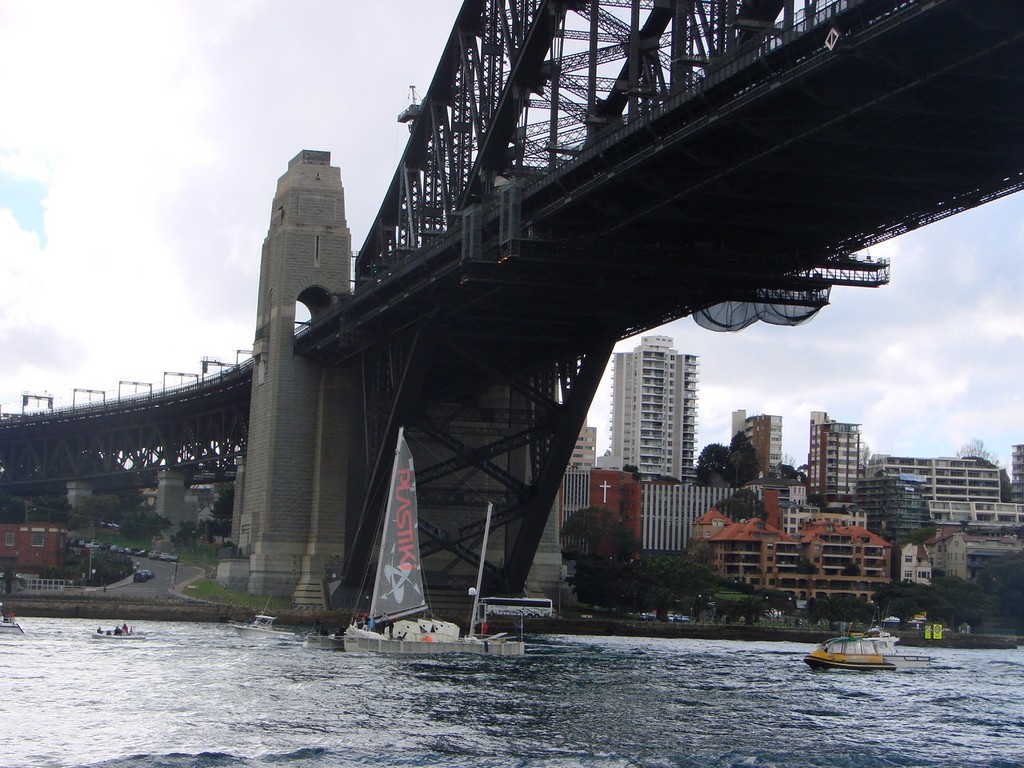Plastiki arrives Australia with a bottled message
by Nancy Knudsen on 26 Jul 2010

Plastiki arriving under Sydney Harbour Bridge BW Studios
After a small near-collision with a large black submarine, and a quick save by Rothschild Banking heir David de Rothschild, sporting a bright pink fender to match his bright pink beanie, Plastiki, the catamaran made of 12,500 plastic bottles successfully docked and ended her eighteen week journey from San Francisco to Sydney.
With a media turnout described by Australia's National Maritime Museum representative Kym McKay as 'the biggest media scrum' she'd seen for a long while, Plastiki arrived on Australia's shores with a strong message for Australia, the USA and the world. 'STOP USING PLASTIC BAGS AND POLYSTYRENE CUPS!'
With a crew of one female skipper and five male crew of varying sailing ability, the Plastiki, constructed by David de Rothschild and a team of helpers and designed by Australian marine architect Andrew Dovell from 12,500 plastic bottles, spent 128 days crossing the Pacific, travelling over 8,000 miles. They arrived outside Sydney Harbour's Heads in bright sunshine to a flotilla of small vessels to escort them to their dock in Darling Harbour, where the unusual yacht will be on display for the next month.
The purpose of the Plastiki's voyage was to draw attention to the myriad problems caused by plastic in our oceans. The historic expedition was completed in four legs : San Francisco - Kiribati - Western Samoa - New Caledonia before reaching the Australian Coast (Mooloolaba) on Monday 19 July and continuing on to Sydney.
The Plastiki is a very strange sailing boat, and the crew all described how difficult she was to steer across the ocean, and how slow.
'We were determined that the 12,500 bottles from which Plastiki is constructed should show, and that meant she had anything but a smooth hull,' said expedition entrepreneur David de Rothschild.
'Steering was an affair that required full concentration,' said ocean racing skipper Jo Royle, 'we did only one hour helming at a time - it was quite an effort. If you made a mistake and gybed the boat, it might be many hours before we could manage to gybe her back again safely.'
With all that, the crew all reported a happy ship, and that their confined space did not destroy the harmony on board.
The crew were welcomed by Sydney's Deputy Lord Mayor Phillip Black and the US Ambassador to Australia Jeffrey Bleich and 'Clean-up' visionary Ian Kiernan, who all spoke with high praise for the Plastiki endeavour and had their own environmental messages.
David, after an impassioned speech on the urgency of world action to prevent the destruction of our oceans with plastic, presented an empty plastic bottle to Councillor Black on behalf of sister city San Francisco. He said it was to plead for Sydney to join San Francisco in a commitment to passing legislation that would eliminate 'single-use plastic' from the city.
Asked if he had a message for Australia's Prime Minister Julia Gillard or the Opposition Leader Tony Abbott, David replied, 'Yes. If you want to have and ounce of credibility as a leader, give nature a chance! There is too much short term thinking in politics generally, and nature is in urgent need of a voice. '
'Now is the time (after the voyage) for the Chapter of Change. It can be done, with the help of individuals, companies and legislation.'
He talked of finding minute pieces of plastic in the North Pacific Garbage patch, a thousand miles from the nearest land, and described how vital it was to prevent innocent fishermen from dumping their used nets in the ocean to foul the habitats of sealife.
Achim Steiner, UN Under-Secretary General and Executive Director of the United Nations Environment Program, also spoke of the urgent need to address the issue, quoting:
World wide, 13-15,000 pieces of plastic are dumped into the ocean every day.
Every year, 6.4 million tonnes are dumped into the ocean. This is the same as 3,200 kilometres of trucks each loaded with garbage.
At least two thirds of the world's fish stocks are suffering from plastic ingestion.
Ocean acidification is a growing problem
Scientists have identified 200 areas declared as 'dead zones' where no life organisms can now grow.
And what is to happen to the Plastiki after she has been on display for a month? David de Rothschild sounded whimsical. 'I am not sure. Originally,' he said, 'she was to have been recycled again. However, so much love and hand-making energy has gone into her manufacture, I am just not sure.'
One thing he is sure of, however, is the relative ease with which we could cut out some of the worst excesses of plastic. 'Some of the problems are complex,' he said, 'but we could cut out plastic bags and polystyrene cups by legislation, NOW.'
If you want to link to this article then please use this URL: www.sail-world.com/72506